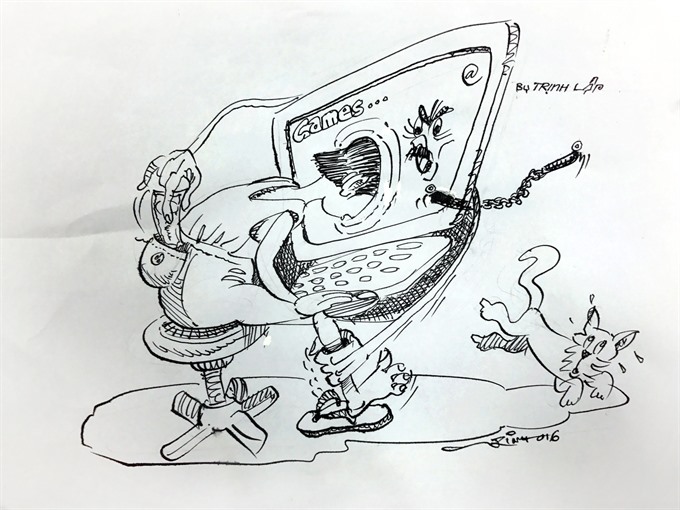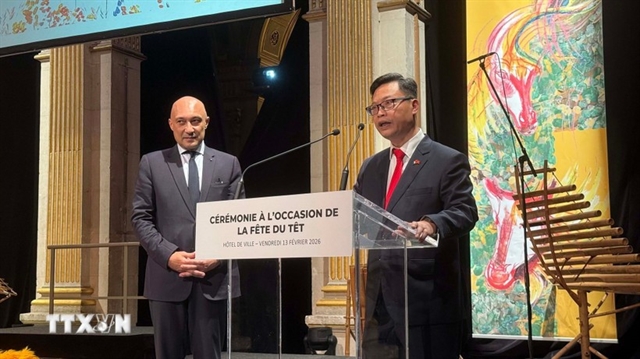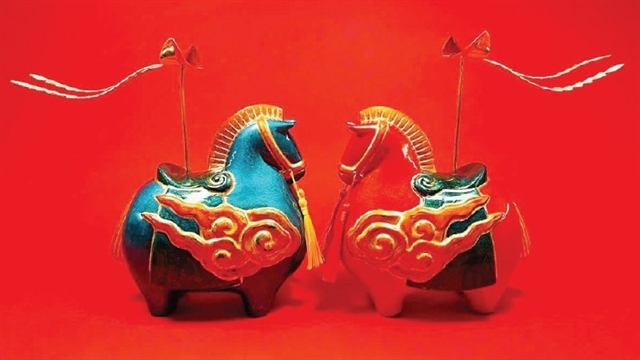 Talk Around Town
Talk Around Town

The word ‘game’, a consistent point of contention among adults and children, has once again initiated a battle between parents and educators. However, this time, the source of the game for children is those working in education and training.
 |
| Illustration by Trịnh Lập |
The word ‘game’, a consistent point of contention among adults and children, has once again initiated a battle between parents and educators. However, this time, the source of the game for children is those working in education and training.
Children born in the early years of this century, known as Generation Z, are identified by their use of the Internet from a young age. Members of this generation are typically thought of as being comfortable with technology, with social media websites as the venue for much of their social interactions.
Matters concerning this generation, especially their activities in virtual space, are a worry for parents. Lately, a lot of unease has been based around an online game entitled Chinh Phục Vũ Môn (Clash of Dice), initiated and co-organised by the Hồ Chí Minh Communist Youth Union 2 years ago.
The game, organised in the form of an online general knowledge contest for highschoolers, according to the founders, is aimed at creating a useful playground for developing creativity and helping kids to enhance their general knowledge and social skills. It also attempts to assist in using the Internet more efficiently for study and leisure activities.
The game was developed by Egame Joint Stock Company, then approved and kicked off by the Ministry of Education and Training.
Concerns over the game were raised by Trần Trọng An, a caring father from Hà Nội’s Hoàng Mai District, when he spotted his 5th grade son playing the game for a long duration of time. Shocked to learn that the game was encouraged by the school board, even though his son was still only a primary student, and concerned over the educational content of the game, An sent a note to Education and Training Minister Phùng Xuân Nhạ.
From what An has learned, the ministry has issued an official document asking all high schools in the area to promote this game for their students. However, Clash of Dice managed to also find its way into primary schools.
He wrote, “Since last October, the game has spread nationwide, and as per Egame’s announcement, it has 800,000 players, who are required to pay with an Ecoin card, designed only for the game, or mobile cards of between VNĐ10,000 to 300,000 to buy virtual items in the game.
"So, can anyone assure me, and other parents, that the game’s content is useful and safe for our children? I think the game will have negative repercussions for primary students, who are still developing mentally and physically, when they have to deal with competitive gambling, and money matters in this game. If it really is safe for the kids, I hope you (the minister) will clarify the situation for us.”
After receiving the request, the minister has asked all units, agencies and the youth union to stop all game activities. He has also asked key units to review the efficiency of ongoing or prescheduled contests, and ensure that they are shut down if any bad effects on students are discovered.
A spokesperson for the ministry said it encouraged students to be active in their studies through a number of channels, including online, but they must be safe.
Head organiser of the contest, Nguyễn Phú Trường, said in order to improve the quality of the game, the organising board would welcome all ideas and opinions on their website https://chinhphucvumon.vn.
Parents and students have responded differently towards the note and the minister’s response.
A highschool teacher from Hà Nội, Dương Tiến Thái, said "We must consult students, who had first-hand experience of the game, instead of attacking it. Some students in my neighbourhood said the mobile card charges had nothing to do with the process of the game. It is also a nationwide contest, so at least 50-70 contestants have only managed to pass through levels 1 and 2," Thái said.
"Regarding the game itself, what we need to monitor is the length of time kids are playing for, reviewing and changing the gambling factor and the payment methods, while keeping true to its original purpose of education. In this digital era ruled by Facebook, 4th and 5th graders are attracted to multiplayer games like League of Legends and Dota, with Clash of Dice being an entertaining and educational alternative. Why should we stop it now?”
A housewife named Khánh Hạ agrees, saying "It would be a shame if the game was forced to stop."
“I hope the organising board will listen to the opinions of teachers and students who have participated in the contest. I personally let my kid play, and I can make sure that no fees are charged at all. The most important factor is those who organised this game, so administrators, please do your research carefully before jumping to conclusions,” she added.
Another mother argued that stopping the game was the right move, adding that the decision must be determined carefully, unlike those that had been made before, “Do not turn our kids into experiments, and ruin a whole generation”.
Ngô Gia Lâm, a father of two, asked why educators did not take their students for outdoor activities, rather than damaging their health with online games. A teacher himself, he thinks this kind of game only leads to bad scores for students and lessens their learning ability.
Đậu Hoàng Diễn, an 8th grader, feels sad about the ministry’s decision. “I have been playing the game for two years, and I found it really helped broaden my knowledge. My only concern was over the fee, as people said this was not suitable in a game for children, so I think the organisers should get rid of this part,” he said.
Đặng Hoàng Nguyên from an international school provided another point.
“I think there is an ambiguity between game and contest here. Why is this contest attracting so much criticism from parents? First, there is a confusion between the two domains of cpvm.vn and chinhphucvumon.vn, proving even the web organisation is unclear. Second, on the site, the ministry notes the content of chinhphucvumon.vn contest is different from the game," he said.
"However, anyone who enters the website with no intention of playing can also join the game. Thus, people can play the game without competing in the contest. Who wants to compete when I can just play the game, much better right? The point is the organisers should make a clear distinction between the game and contest, and they should not use two websites with two different goals: competing and commercial."
Currently, the ministry has not confirmed whether it would restart the game or not.
As an older sister of a primary student, I assume while we are all waiting for a response from the ministry, why don’t parents spend more time for outdoor activities with their kids, and take the time to listen to what they really want. If another two or three games are created or stopped, what matters in the end is that we learn to be close friends to our kids, rather than forcing them to do what adults want. VNS




